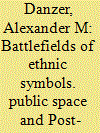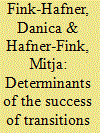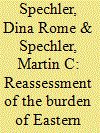|
|
|
Sort Order |
|
|
|
Items / Page
|
|
|
|
|
|
|
| Srl | Item |
| 1 |
ID:
091594


|
|
|
|
|
| Publication |
2009.
|
| Summary/Abstract |
This article provides an analysis of interdependencies between post-Soviet Erinnerungspolitik in public space and the individual perception of urban reconfigurations by ethnic Germans in Kazakhstan. Applying a qualitative social-geographic approach the author examines determinants of the process of ethnic symbolisation of real and imagined places. Individual biography and the extent of Soviet socialisation are factors shaping the personal perception of symbolic landscapes. From the perspective of the individual, space reflects the power distribution within society and hence, impacts on individual identity formation. Depending on the dominance of internal as opposed to external identification, the (perceived) changing ethnicised landscape of cities potentially fuels ethnic tension.
|
|
|
|
|
|
|
|
|
|
|
|
|
|
|
|
| 2 |
ID:
091596


|
|
|
|
|
| Publication |
2009.
|
| Summary/Abstract |
The article provides an analysis of the determinants of the success of transitions to democracy based on a combination of qualitative comparative analysis of Poland, the Czech Republic, Slovakia, Hungary, Slovenia, Croatia, Bosnia & Herzegovina, Serbia, Montenegro and Macedonia; and hierarchical clustering. The key finding is that one can reveal configurations of several factors which jointly determine either continuous or disrupted transitions to democracy.
|
|
|
|
|
|
|
|
|
|
|
|
|
|
|
|
| 3 |
ID:
091597


|
|
|
|
|
| Publication |
2009.
|
| Summary/Abstract |
The main purpose of this article is to establish to what extent migration from Bulgaria and Romania to Spain first, has a temporary and circulatory or a long-term and permanent nature, and secondly, responds to family or individual strategies. Several indicators are analysed: demographic composition; family reunification processes; migratory strategies within the family framework; the age of immigrants' children; and the frequency of movements between the destination and origin. The article demonstrates that many immigrants do not follow family reunification strategies but rather adopt individual strategies and that long term migration is the predominant pattern.
|
|
|
|
|
|
|
|
|
|
|
|
|
|
|
|
| 4 |
ID:
091591


|
|
|
|
|
| Publication |
2009.
|
| Summary/Abstract |
Existing studies emphasise the important roles played by negative health lifestyle practices in the health situations of the countries constituting the former Soviet Union, and the role of smoking has attracted a considerable body of research. This article analyses female smoking behaviour in eight former Soviet states and seeks to more closely identify the roles of psychological distress and political ideology in relation to tobacco use in these countries. Results suggest that, in these populations, distress and ideology are associated with smoking practices in specific, observable, and sometimes unexpected ways. Findings are discussed within the context of changing gender constructions and dynamics following the post-communist transition.
|
|
|
|
|
|
|
|
|
|
|
|
|
|
|
|
| 5 |
ID:
091590


|
|
|
|
|
| Publication |
2009.
|
| Summary/Abstract |
This article investigates the changing intersections between religion and politics in Muslim Central Asia. Adopting a long-term historical perspective, it shows how successive regimes meshed and clashed with Islam in their efforts to assert worldly power. Religion was uniformly marginalised in the era of Marxist-Leninist-Maoist socialism, but the cases of Kyrgyzstan, Turkmenistan and Xinjiang show that religion has been playing somewhat different roles across the region since 1991. For the secular authorities, Islam may be valued as a source of nation building or it may be feared as a potentially destabilising force. The resulting attempts to co-opt, channel and control religious expression provide insights into the nature of secular power and raise questions concerning the applicability to this region of influential theories in the sociology of religion.
|
|
|
|
|
|
|
|
|
|
|
|
|
|
|
|
| 6 |
ID:
091599


|
|
|
|
|
| Publication |
2009.
|
| Summary/Abstract |
A comprehensive accounting of the contributions and costs of East European satellite states to Soviet foreign and defence policy indicates that they were hardly ever a 'burden' to the USSR, even at their most costly in 1982, and therefore Gorbachev's decisions later in the decade to allow those regimes to distance themselves from Moscow must be interpreted as part of the Soviet leader's overall political strategy, not a result of material inability to maintain the status quo.
|
|
|
|
|
|
|
|
|
|
|
|
|
|
|
|
| 7 |
ID:
091595


|
|
|
|
|
| Publication |
2009.
|
| Summary/Abstract |
The predominant view in the literature holds that the main objective of the Soviet rulers was growth of the official measure of aggregate output, irrespective of its use structure, that is, growth for its own sake. We show that the pursuit of this objective would have been irrational, and argue instead that the main objective was the pursuit of military might. This formulation returns the Soviet rulers to the company of rational economic actors, helps explain the main characteristics of the Soviet economic development better than the majority view, and provides a different perspective on the system's final decades.
|
|
|
|
|
|
|
|
|
|
|
|
|
|
|
|
|
|
|
|
|